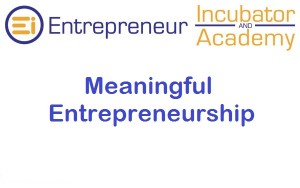 There is a recently published study by Stanford University, about the way we construct our experiences, proving that though the principles of meaning and happiness overlap, a meaningful life is ultimately more important than a happy one. So, what is the difference then?
There is a recently published study by Stanford University, about the way we construct our experiences, proving that though the principles of meaning and happiness overlap, a meaningful life is ultimately more important than a happy one. So, what is the difference then?
Putting your energy into cultivating an experience that is meaningful entails something more than whatever appeases your own wants and desires in the moment. Happiness is a fleeting feeling, whereas meaning is a stable foundation. Because if you cut down the things that matter to the reasons why they matter, you will realize that the common denominator is that they all give you a sense of belonging, fulfillment and purpose.
Ultimately, meaning is attainable. Meaning is something we can choose. That is not always the case with happiness.
Now, let’s take this to entrepreneurship. What is a meaningful entrepreneurship?
Meaningful entrepreneurs are the entrepreneurs who are enterprise growers and, therefore, job creators.
So, do you think you are a meaningful entrepreneur?
In his blog, Michael Gerber, a legendary entrepreneur, mentioned that a true entrepreneur starts with an inspiration, an innovative or transformative idea for a business, and is driven by the prospect of growth and reinvention.
The world needs more and more true entrepreneurs, entrepreneurs who are inspired to create, to be inspired to innovate, to be inspired to build a completely new world.
Michael Gerber says the cure for unemployment is not more jobs, but more meaningful entrepreneurs – entrepreneurs who will contribute to the transformation of the economy and to the growth of meaningful, rewarding jobs.
Unemployment is a problem that refuses to go away. The hope lies in the hands of a true entrepreneur, to create meaningful jobs.
Furthermore, in their 2014 report, the Global Entrepreneurship Monitor (GEM) divided entrepreneurial motivation into two drivers: motivational drivers and job-growth expectations. The first one is necessity-driven, which means individuals start businesses because there are no better options to obtain resources for living. The second one is opportunity-driven, which means individuals start businesses based on recognized opportunities.

Leave A Comment